The Armenian Genocide Still Denied by Turkey (and Azerbaijan)
Published on
Armenian as well other people around the world paid homage to the memory of 1.5 million innocent victims of the 1915 Armenian Genocide implemented by the Ottoman Empire.
98 years after the Genocide the present Turkish nation not only deny that its predecessors plotted and committed the Genocide, but also continues its anti-Armenian policy, still retaining confiscated church estates and properties, and religious and cultural treasures of the Armenian people.
NYT 1915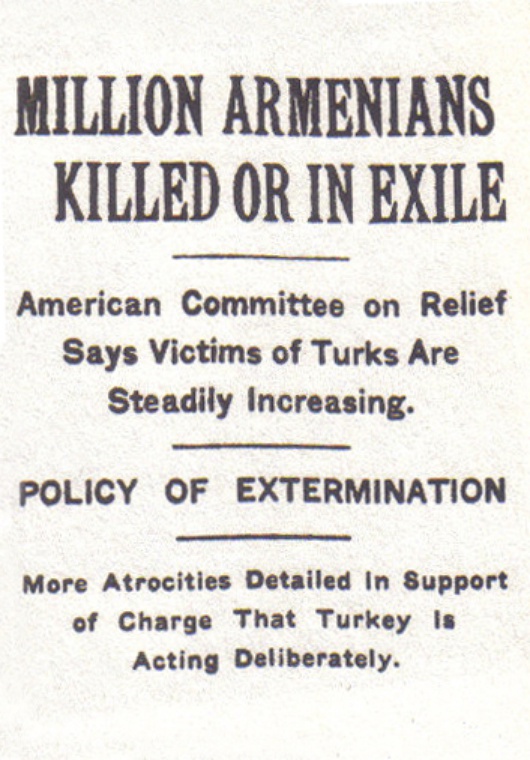
Different views about history have their impact also today when the frozen conflict of Artsakh, better known as Nagorno-Karabakh, still waits its solution. Nineteen years after the ceasefire in 1994, an agreement between Armenia and Azerbaijan is still not reached and the Nagorno-Karabakh Republic continues its existence as a de facto independent republic recognized by no other state.
The Balkan Wars as background
The First Balkan War, which lasted from October 1912 to May 1913, pitted the Balkan League (Serbia, Greece, Montenegro and Bulgaria) against the Ottoman Empire. The combined armies of the Balkan states overcame the numerically inferior and strategically disadvantaged Ottoman armies and achieved rapid success. The Balkan Wars resulted in a defeat of the Ottoman Empire and the loss of 85% of its territory in Europe which were and partitioned among the allies.
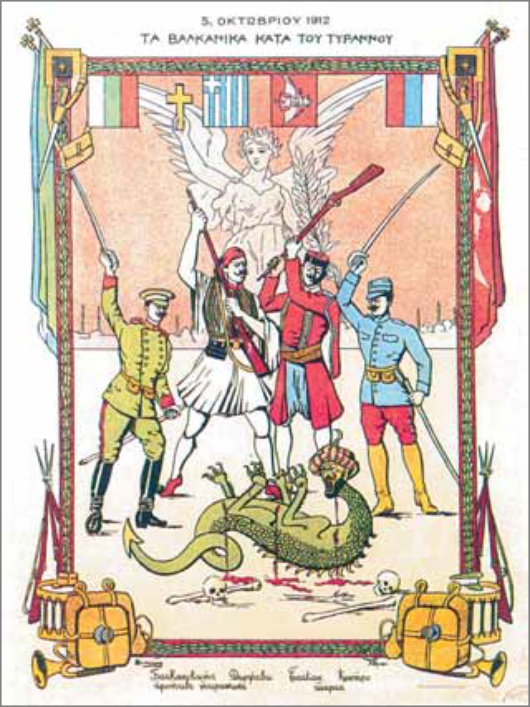 An
important consequence of the Balkan Wars was also the mass expulsion of
Muslims from the Balkans. Already beginning in the mid-19th century,
hundreds of thousands of Muslims were expelled or forced to flee from
the Caucasus and the Balkans as a result of the Russo-Turkish wars and
the conflicts in the Balkans. Muslim society in the empire was incensed
by this flood of refugees and overcome by a desire for revenge.
An
important consequence of the Balkan Wars was also the mass expulsion of
Muslims from the Balkans. Already beginning in the mid-19th century,
hundreds of thousands of Muslims were expelled or forced to flee from
the Caucasus and the Balkans as a result of the Russo-Turkish wars and
the conflicts in the Balkans. Muslim society in the empire was incensed
by this flood of refugees and overcome by a desire for revenge.
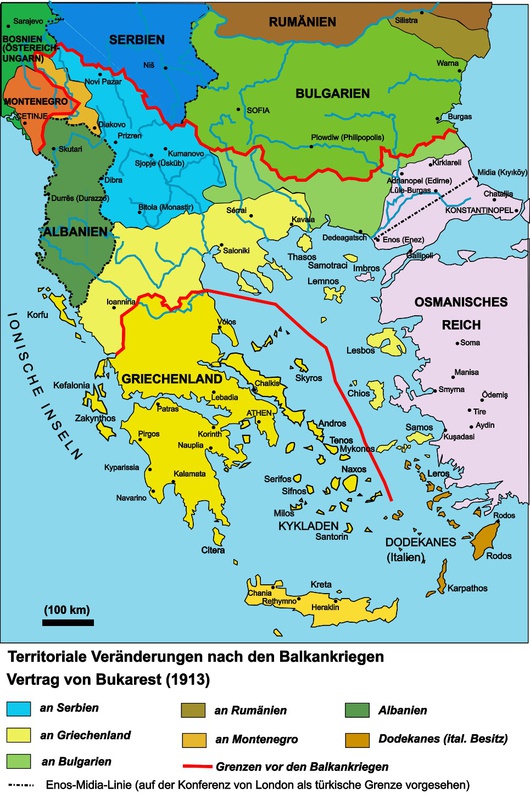 After
the Balkan Wars (1912-13) the Turkish nationalist movement in the
country gradually came to view Anatolia as their last refuge. That the
Armenian population formed a significant minority in this region would
figure prominently in the calculations of the Young Turks who would
eventually carry out the Armenian Genocide. During the First World War,
the Turkish authorities accused Armenians of sympathizing with Russia
and used it as a pretext to declare the entire Armenian population their
enemy.
After
the Balkan Wars (1912-13) the Turkish nationalist movement in the
country gradually came to view Anatolia as their last refuge. That the
Armenian population formed a significant minority in this region would
figure prominently in the calculations of the Young Turks who would
eventually carry out the Armenian Genocide. During the First World War,
the Turkish authorities accused Armenians of sympathizing with Russia
and used it as a pretext to declare the entire Armenian population their
enemy.
The Armenian Genocide
The Armenian Genocide, also known as the Armenian Holocaust, the Armenian Massacres and, among Armenians, the Great Crime was the Ottoman government's systematic uprooting and extermination of its minority Armenian population from their historic homeland in Turkey. The starting date of the genocide is conventionally held to be April 24, 1915, the day when Ottoman authorities arrested and massacred some 250 Armenian intellectuals and community leaders in Constantinople(Istanbul), on orders from the Turkish government. Tragic events took place during and after World War I, in two phases: the wholesale killing and enslavement of the able-bodied males, and the deportation of women, children, the elderly and infirm on death marches to the Syrian Desert. In addition women and children were placed on boats and drowned at sea, or crucified. There is also evidence that children were put to death with poison gas in schools that were converted to death camps.
The total number of Armenians killed as a result is estimated at between 1 and 1.5 million in period of 1915-1923. Armenia claims that the total number of dead exceeds 1.5 million people, the half of all Armenians at the beginning of the last century. The Assyrians, the Greeks and other minority groups were similarly targeted for extermination by the Ottoman government, as part of the same genocidal policy. It is considered by many to have been the first modern genocide, due to the organized manner in which the killings were carried out to eliminate the Armenians.
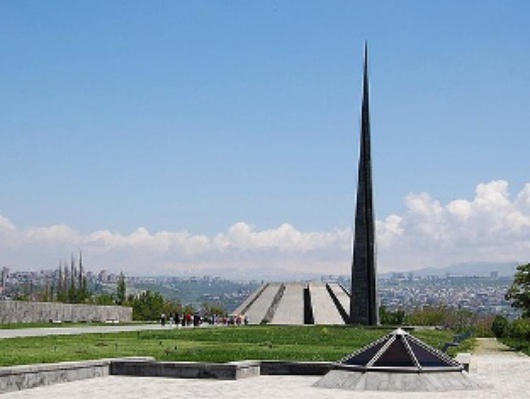 However
the Armenian Genocide can also be seen otherwise, not as having begun
in 1915, but rather as an ongoing genocide, from 1894, through 1908/9,
through World War I and right up to 1923. For example 200,000-300,000
Armenians were massacred in Turkey on period 1894-1896.
However
the Armenian Genocide can also be seen otherwise, not as having begun
in 1915, but rather as an ongoing genocide, from 1894, through 1908/9,
through World War I and right up to 1923. For example 200,000-300,000
Armenians were massacred in Turkey on period 1894-1896.
Genocide is the organized killing of a people for the express purpose of putting an end to their collective existence. Because of its scope, genocide requires central planning and a machinery to implement it. This makes genocide the quintessential state crime as only a government has the resources to carry out such a scheme of destruction. The Armenian Genocide was centrally planned and administered by the Turkish government against the entire Armenian population of the Ottoman Empire, it was carried out during WWI between the years 1915 and 1918 and the atrocities were renewed between 1920 and 1923.
Recognize or deny
"The nearest successful example [of collective denial] in the modern era is the 80 years of official denial by successive Turkish governments of the 1915-17 genocide against the Armenians in which 1.5 million people lost their lives. This denial has been sustained by deliberate propaganda, lying and cover-ups, forging documents, suppression of archives, and bribing scholars."
(Stanley Cohen, Professor of Criminology, Hebrew University, Jerusalem)
In recent years, parliaments of several countries have formally recognized the event as genocide. Turkish entry talks with the EU were met with a number of calls to consider the event as genocide though it never became a precondition (so far).
The fact of the Armenian Genocide is recognized by many states. It was first recognized in 1965 by Uruguay. In general, the Armenian Genocide in Ottoman Turkey has already been recognized e.g. by Russia, France, Italy, Germany, the Netherlands, Belgium, Poland, Lithuania, Slovakia, Switzerland, Sweden, Greece, Cyprus, Lebanon, Canada, Venezuela, Argentina, and 42 U.S. states. Armenian Genocide was recognized also by the Vatican, European Parliament and the World Council of Churches.
The position of Israel is most interesting or even ambivalent as the Jews have first hand experience about genocide/holocaust. From my perspective more than any other nation, Israel has the moral obligation to recognize the Armenian Genocide. On November 7, 1989 the Union for Reform Judaism passed a resolution on recognition of Armenian Genocide. This year the Knesset held a ceremony to mark the memory of the Turkish genocide of Armenians. MK Reuven Rivlin (Likud) said before the ceremony that he believes that "as human beings and as Jews, we must not ignore the catastrophe of another nation for any reason, including diplomatic considerations, important as they may be. We will mark the annual memorial day for the massacre of the Armenian people regardless of the relations with today's Turkey, which is an ally." Turkey was of course highly displeased with the Knesset's decision to mark the day. Various events devoted to the subject, which were supposed to be held at the Knesset, were cancelled in recent years because of Turkish pressure. Anyway Israel progressing with this issue as the Knesset’s Education Committee will hold a discussion on Monday (29th Apr.2013) regarding two initiatives presented by Members of Knesset Professor Arieh Eldad (Hatikva) and Zehava Gal-On (Meretz) to recognize the Armenian genocide 1915.
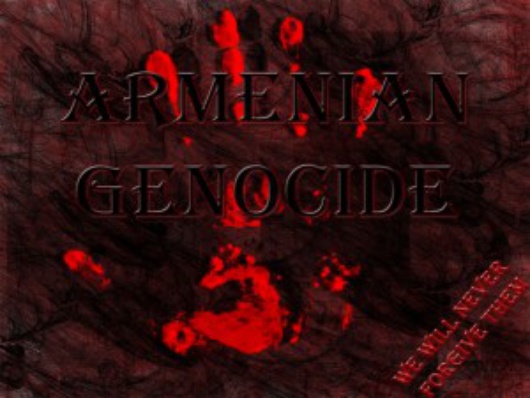 Kurdish
recognition of the Armenian Genocide is the recognition of the Kurdish
participation in the ethnic cleansing of Armenians during WWI, when
Kurdish tribal forces attacked and killed Armenian civilians and
refugees. In several of the Kurdish regions, the Kurds participated in
the genocide of the Armenians while others opposed the genocide, in many
cases even hiding or adopting Armenian refugees.
Kurdish
recognition of the Armenian Genocide is the recognition of the Kurdish
participation in the ethnic cleansing of Armenians during WWI, when
Kurdish tribal forces attacked and killed Armenian civilians and
refugees. In several of the Kurdish regions, the Kurds participated in
the genocide of the Armenians while others opposed the genocide, in many
cases even hiding or adopting Armenian refugees.
On 2010 the Serbian Radical Party submitted a draft resolution to the Serbian parliament condemning the genocide committed by Ottoman Turkey against Armenians from 1915 to 1923. SRS submitted the draft so that Serbia can join the countries which have condemned the genocide. At the end of 2011, the Serbs in Bosnia started an initiative to make Armenian genocide denial illegal.
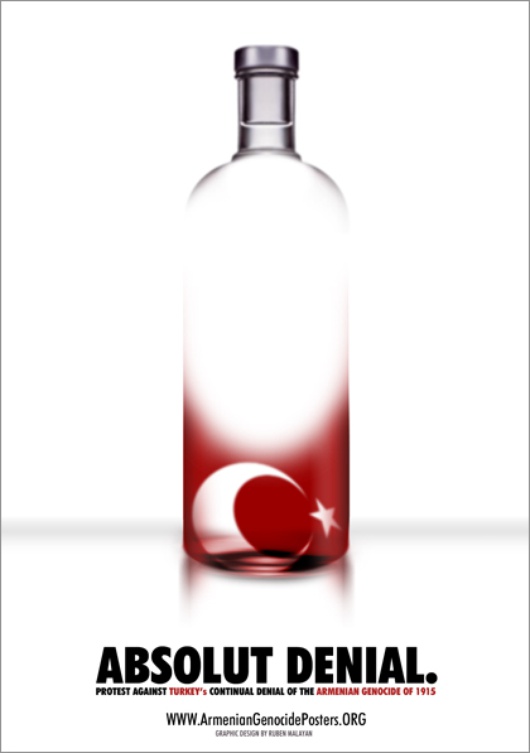 Turkey
has consistently denied responsibility for the genocide, which is
sometimes referred to as the Armenian Holocaust. Azerbaijan, being in
deep strategic alliance with Turkey and in a state of war against
Armenia, shares the position of Turkey.
Turkey
has consistently denied responsibility for the genocide, which is
sometimes referred to as the Armenian Holocaust. Azerbaijan, being in
deep strategic alliance with Turkey and in a state of war against
Armenia, shares the position of Turkey.
Some countries, including Argentina, Armenia, Slovakia, Slovenia, Switzerland and Uruguay have adopted laws that punish genocide and also in October 2006, the French National Assembly passed a bill which will make Armenian Genocide denial a crime. Last week, France ratified a bill in parliament, according to which denying the 1915 Armenian genocide would be punishable by a jail sentence of up to one year and a 45,000 Euro fine. The bill has yet to receive final approval in the French senate.
Artsakh aka Nagorno-Karabakh
Docent of the Plekhanov Russian University of Economics Alexander Perinjiyev believes that the war between Armenia and Azerbaijan is inevitable. Moreover, Perinjiyev predicts when Azerbaijan will open hostilities. It would be logical if this military campaign would start immediately after the Olympic Games in Russia's Sochi.
Old ethnic tensios take place in region also today. Artsakh was the tenth province of the Kingdom of Armenia from 189 BC until 387 AD. Much of historical Artsakh presently overlaps with the region of Nagorno-Karabakh. Populated for centuries by Christian Armenian and Turkic Azeris, Karabakh became part of the Russian empire in the 19th century. The conflict has roots dating back well over a century into competition between Christian Armenian and Muslim Turkic and Persian influences.
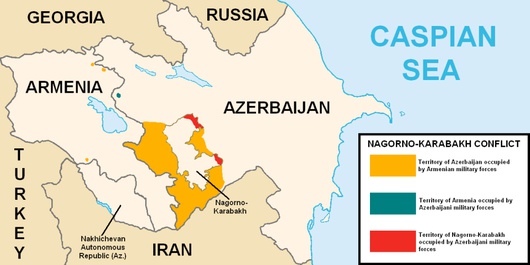 The
conflict started in 1989, when the Nagorno Karabakh Autonomous Oblast, a
predominantly Armenian territory within Soviet Azerbaijan, declared its
independence from Azerbaijan and union with Armenia. The resulting
tension between the Armenian and Azerbaijani residents soon turned into
an ethnic conflict and finally to the 1991–1994 Nagorno-Karabakh War,
which ended with a ceasefire that left the current borders. As the
Azeris in Armenia, Nagorno-Karabakh, and surrounding territories fled to
Azerbaijan, the Armenians in Azerbaijan moved to Armenia proper. The
total number of displaced people is estimated to be one million. Today,
Nagorno-Karabakh is a de facto independent state, calling itself the Nagorno-Karabakh Republic.
It is closely tied to the Republic of Armenia and uses the same
currency, the dram. On the other side according to reports as yet
unconfirmed Turkey still trains Azerbaijani soldiers in Turkey for the
purpose of attacking Armenia.
The
conflict started in 1989, when the Nagorno Karabakh Autonomous Oblast, a
predominantly Armenian territory within Soviet Azerbaijan, declared its
independence from Azerbaijan and union with Armenia. The resulting
tension between the Armenian and Azerbaijani residents soon turned into
an ethnic conflict and finally to the 1991–1994 Nagorno-Karabakh War,
which ended with a ceasefire that left the current borders. As the
Azeris in Armenia, Nagorno-Karabakh, and surrounding territories fled to
Azerbaijan, the Armenians in Azerbaijan moved to Armenia proper. The
total number of displaced people is estimated to be one million. Today,
Nagorno-Karabakh is a de facto independent state, calling itself the Nagorno-Karabakh Republic.
It is closely tied to the Republic of Armenia and uses the same
currency, the dram. On the other side according to reports as yet
unconfirmed Turkey still trains Azerbaijani soldiers in Turkey for the
purpose of attacking Armenia.
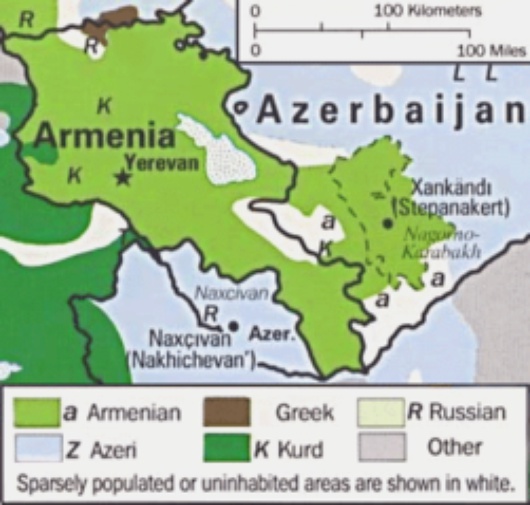 The
political situation in region is quite confusing. Armenia accounts for
the Russian military base. Russia sponsors Armenia, actively supports it
in many issues one can say that the relations between Moscow and
Yerevan have reached the level of allied partnership. It is clear that
Russia would not want to lose such an important ally in such a serious
and potentially explosive geopolitical region. Azerbaijan has close
military ties with NATO member Turkey. Iran, which borders both, is the
biggest wildcard; although Shiite Muslim like Azerbaijan, Tehran reviles
Baku because of Azerbaijan’s secular orientation, its close ties with
Israel, and fears about separatist tendencies among Iran’s large Azeri
minority. Iran, ironically, has far better ties with Christian Armenia.
Turkey closed its border with Armenia in 1993.
The
political situation in region is quite confusing. Armenia accounts for
the Russian military base. Russia sponsors Armenia, actively supports it
in many issues one can say that the relations between Moscow and
Yerevan have reached the level of allied partnership. It is clear that
Russia would not want to lose such an important ally in such a serious
and potentially explosive geopolitical region. Azerbaijan has close
military ties with NATO member Turkey. Iran, which borders both, is the
biggest wildcard; although Shiite Muslim like Azerbaijan, Tehran reviles
Baku because of Azerbaijan’s secular orientation, its close ties with
Israel, and fears about separatist tendencies among Iran’s large Azeri
minority. Iran, ironically, has far better ties with Christian Armenia.
Turkey closed its border with Armenia in 1993.
Israel has been developing closer ties with Azerbaijan and have helped modernize the Armed Forces of Azerbaijan. It is claimed that with this cooperation Israel has ”bought” an airport for planned strike against Iranan nuclear facilities. On the other hand Armenian-Jewish relations date back to the time of Armenian emperor Tigranes the great , who, retreating from Judea, took 10,000 Jews with him on his return to the Kingdom of Armenia. Israel itself is home to the Armenian Quarter of the Old City of Jerusalem.
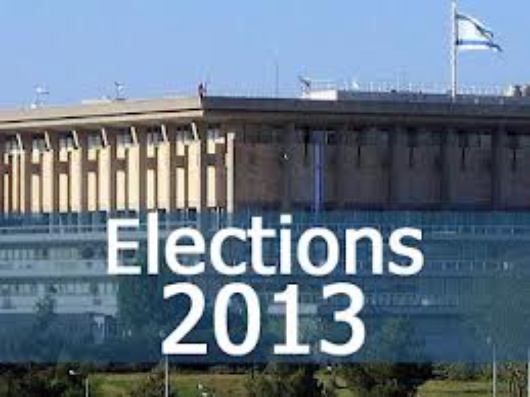 The
final status of Nagorno-Karabakh is a matter of international mediation
efforts of the OSCE Minsk Group, co-chaired by Russia, France and the
United States. At present, the mediation process is at a standstill.
Azerbaijan's position has been that Armenian troops withdraw from all
areas of Azerbaijan outside Nagorno-Karabakh and that all displaced
persons be allowed to return to their homes before the status of
Karabakh can be discussed. Armenia does not recognize Nagorno-Karabakh
as being legally part of Azerbaijan, arguing that because the region
declared independence at the same time that Azerbaijan became an
independent state, both of them are equally successor states of the
Soviet Union. The Armenian government insists that the government of
Nagorno-Karabakh be part of any discussions on the region's future, and
rejects ceding occupied territory or allowing refugees to return before
talks on the region's status.
The
final status of Nagorno-Karabakh is a matter of international mediation
efforts of the OSCE Minsk Group, co-chaired by Russia, France and the
United States. At present, the mediation process is at a standstill.
Azerbaijan's position has been that Armenian troops withdraw from all
areas of Azerbaijan outside Nagorno-Karabakh and that all displaced
persons be allowed to return to their homes before the status of
Karabakh can be discussed. Armenia does not recognize Nagorno-Karabakh
as being legally part of Azerbaijan, arguing that because the region
declared independence at the same time that Azerbaijan became an
independent state, both of them are equally successor states of the
Soviet Union. The Armenian government insists that the government of
Nagorno-Karabakh be part of any discussions on the region's future, and
rejects ceding occupied territory or allowing refugees to return before
talks on the region's status.
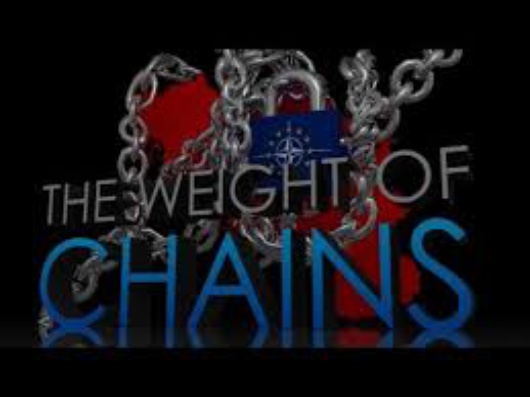 More background information from Genocide1915.info
More background information from Genocide1915.info



